No products


Traceable textile supply chain. Is there a solution?
Traceability of wool in the long supply chain
The issue of traceability in the production of products that have long and global supply chains it is more and more of current affairs.
Long and fragmented chains do not allow a complete vision of all the steps in the supply chain, generating confusion regarding the reconstruction of the path from the raw material, to the assembly and transformation places or on the working conditions. The problem of lack of traceability it is now a pressing urgency to which we must respond thanks to the greater awareness of the final consumer on what is “sustainable” and what isn't.
(we could discuss for a long time whether this awareness is induced by producers or arises from a real sensitivity towards one's own health and that of the environment but the discussion would be very long and we will address the topic of “green washing" and the sense of guilt created in consumers in the future)
"Traceability" and “transparency” in the same way as “sustainability” and “responsibility” have become words used so often, leading us to lose their meaning by transforming them into meaningless sounds like a "mantra"
A 2019 research carried out by the Ministry of Development reported that only 5.3% of companies in the textile and clothing sector had a direct and in-depth awareness of what a traceable supply chain was.
Today in 2021, three years later, when the price of wool started to grow month by month, production is became insufficient for demand, China took over almost all of the of the transformation and spinning of Asian and Oceanic wool and a large part of that worldwide, the theme of “traceability” (perhaps also to oppose the great Asian monopoly) is has become urgent.
There are many certifications and often conflicting with each other but perhaps the one that is currently emerging above the others is that of RWS (Responsible Wool Standard). Without going into the details of how these certifications are issued (we are certain that the checks are real and meticulous), what must attract attention is that these are extremely expensive certifications.
For example, we at ELBEC very often use wool certified GOTS (Global Organic Textile Standard) or RWS by international bodies or by the ICEA (Institute for Energy and Environmental Certifications - as in the case of yarns made in Italy), but we have never managed to have these certifications even on our products because the economic cost to be borne by our small artisan company is unsustainable even if we are certain that we would be able to obtain them easily (from a procedural point of view we respect all standards).
So to summarize, on the one hand we have an increasingly greater attention towards the control of the global supply chain (the MISE Ministry of Economic Development is aiming for a yarn tracking system based on the blockchain - the same as cryptocurrencies so to speak - which would result in exponentially raising the costs of certifications and therefore of products) and the certifications that attest to their truthfulness. but on the other hand we impose very high costs to obtain them, favoring the most successful companies. bigger and bigger difficult to control.
The internal certification bodies will certainly have more difficulties in verifying all the steps of the goods in the supply chain in a multinational that operates internationally in countries with different regulations and standards, compared to a small company that operates with local collaborators.
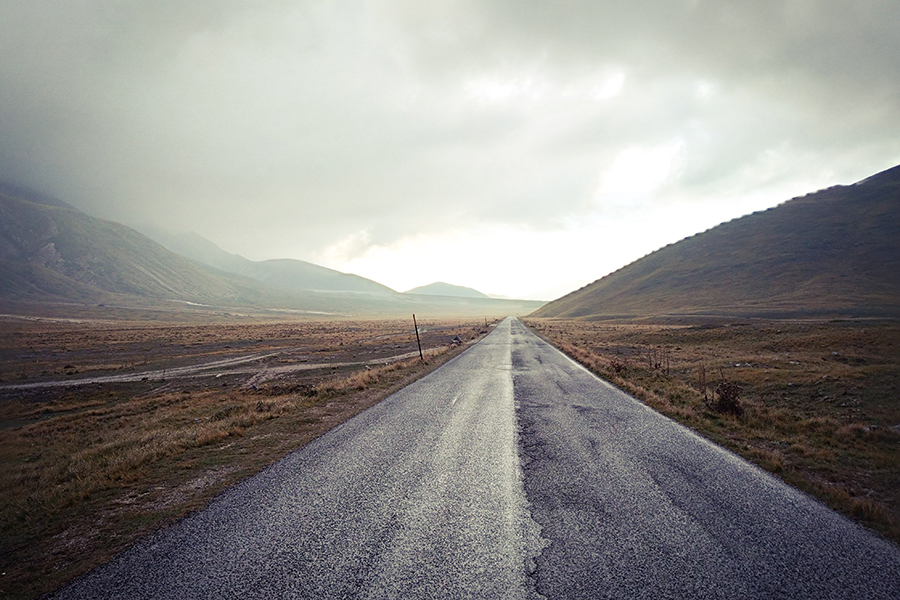 Walking on the road to sustainability
Walking on the road to sustainability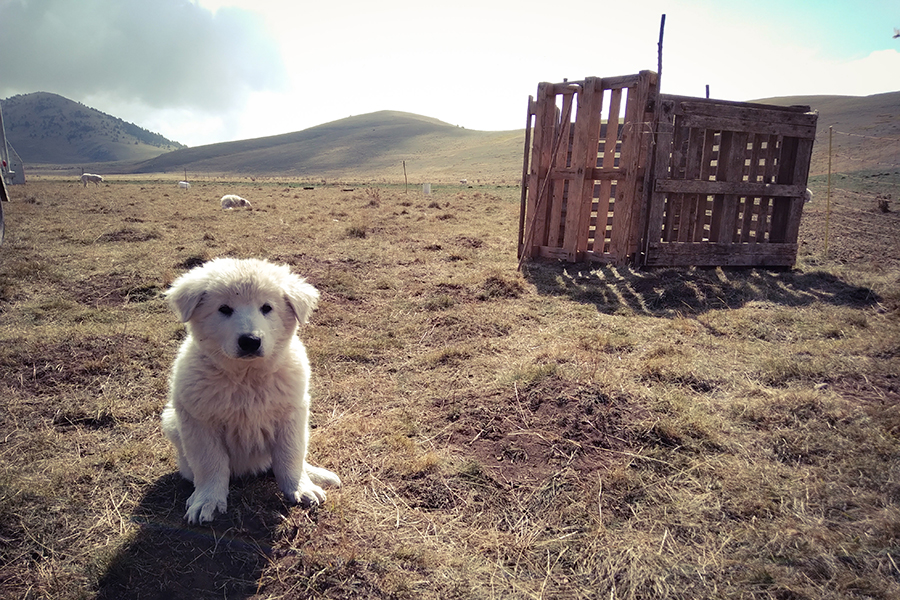 Abruzzo Mastiff puppy on alert
Abruzzo Mastiff puppy on alert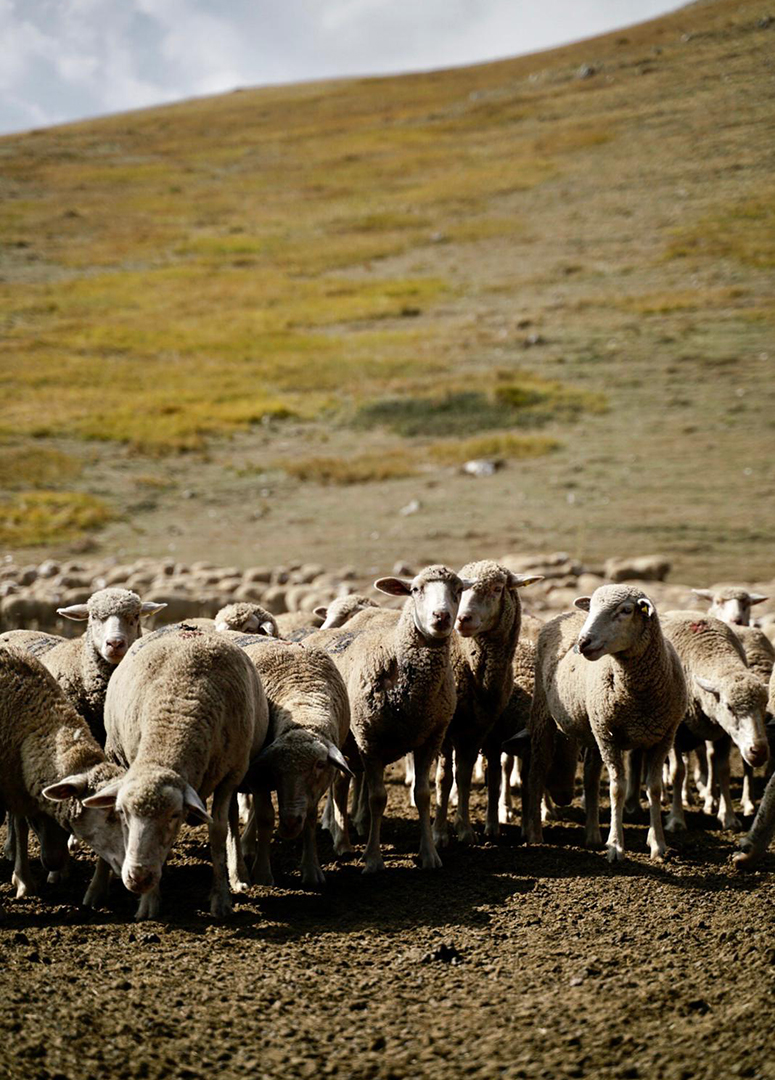 Merinised sheep from Abruzzo
Merinised sheep from AbruzzoThe concept of sustainability
When we started making our first pure merino wool socks for outdoor activities. In the mountains there were few of us who used this highly prized yarn because it most outdoor companies preferred to use lighter synthetic yarns. resistant and more long-lasting but above all much more cheap and easy to work with. Then it's the microplastics scandal broke out!
For us, using merino wool meant making sure that our suppliers did not purchase wool from Australian or New Zealand breeders who practiced MULESING. Our initial research was therefore oriented towards yarn producers who ensured that the wool did not come from farms where this practice was in use.
Then we went through even more checks and certifications. complex and attentive to the animals but also to the operators and the end user. GOTS certification ensures that the wool comes from more organically grown farms. a whole series of animal protection standards such as those of the ZQ fiber protocol.
The GOTS certification also ensures that the product has never come into contact with chemical substances and the color is not fixed with chlorine-based products which always have a high impact on the environment. In short, let's say that at the moment the GOTS certificate is for us the more reliable there is when it comes to sustainability.
However talking about sustainability we cannot avoid making two general considerations which must necessarily exclude the specific product.
The first is the extreme difficulty for consumers but above all for us producers to have real and reliable information on the impacts of a product or a specific production process on the environment. There are very few unbiased studies that honestly compare alternative products or alternative processes.
The second is common sense: for example if now all outdoor and other companies that operate in clothing are looking for the highest quality wool is It is clear that a huge demand is being generated that the market will not be able to meet. to answer and this he cannot be sustainable!
Our concern is that there are nations perhaps culturally less attentive to environmental issues than others that take advantage of this demand to lower the standards of quality and environmental respect which had been achieved with such difficulty.
Moreover, it remains highly topical the topic of the Life Cycle Assessment of a product when talking about sustainability. The entire life of the product from the procurement of the components to the end of life requires including all the energy used and all the Co2 emitted during the entire production, use and disposal phase of the product.
And’ It is evident in this case that if the yarn is produced thousands of kilometers away, sent to another country (perhaps not very attentive to the environment) for the more complex phases. delicate washing and bleaching, then returns to the place of origin to be marketed in flakes, then transformed into by a textile company in Europe, sent again to Asia for painting, etc.
The long supply chain inherent in the global model is in itself unsustainable or to use a euphemism "not very sustainable".
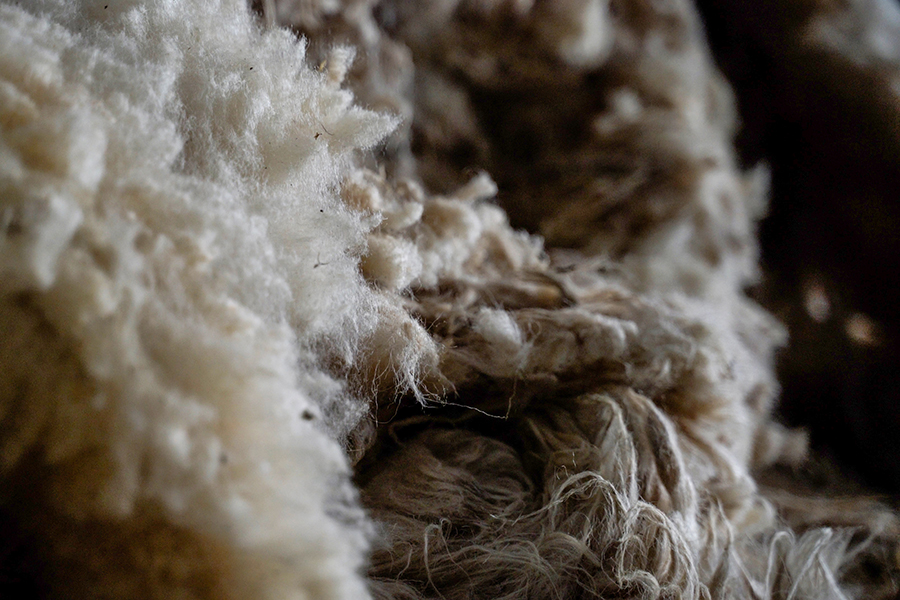 Raw wool waiting to be selectedo
Raw wool waiting to be selectedo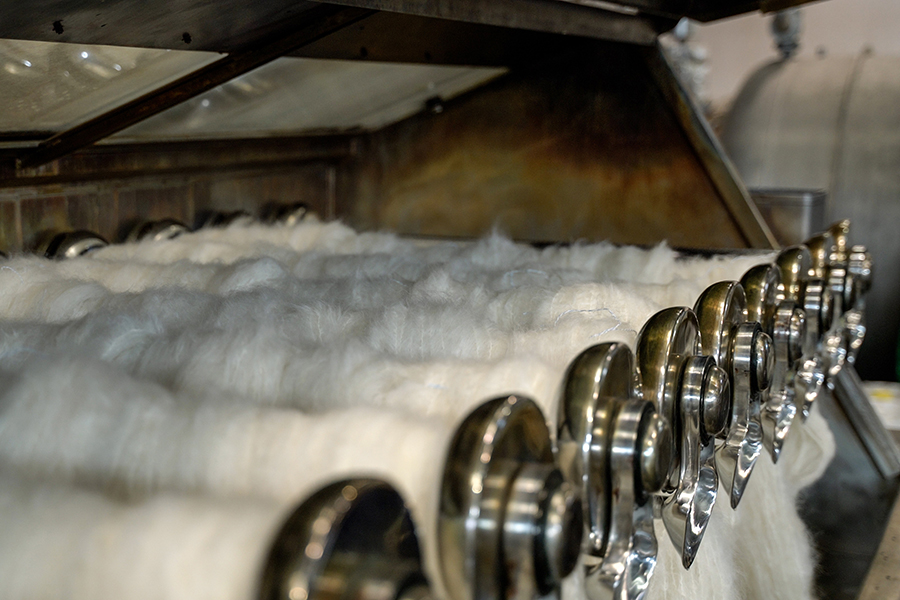 Spun skeins washing
Spun skeins washingThe short supply chain is the solution
As part of the widespread manufacturing project, in which ELBEC creates handmade wool accessories thanks to the work of many women participating in the project in the Dolomites, we decided to embark on a new path in search of truly sustainable production.
Thanks to the meeting of extremely capable professionals in the sector, ELBEC has decided to entirely control the wool supply chain of its products, starting from the animal to the finished product.
The control of the entire supply chain allows us to have traceability true and complete which in this case is not certified by no authorized body but which we know to be true and transparent because it is is based on the close relationship between men and women who work in the sector, who know each other and who speak the same language.
In our opinion, the only way to have a supply chain that is not only traceable but also sustainable is to reduce Co2 emissions.
How? Reducing the length of the supply chain; thus favoring what technicians call Filiera Corta (Short Suplly Chain). For us this is the only real solution!
Italian Merinized wool
Our wool comes from the rugged mountain terrains of Abruzzo and Molise up to the north of Puglia where Merinised sheep find almost perfect pastures. boundless and rich in natural food sources along the transhumance path once known as Tratturo Magno.
The sheep spend the summer months on the mountain pastures while they spend the winter months sheltered in spacious stables. Their diet during the winter is based on dry herbs and natural products.
The Wool Harvest
As tradition dictates, the sheep are shorn strictly by hand, only once a year in spring by an extremely skilled and attentive Italian cooperative that knows how to treat the animals with the utmost respect, avoiding unnecessary complications during an activity. delicate for the animal's health.
The collected fleeces are selected by skilled qualified professionals capable of carrying out an initial sorting based on the length and fineness of the hair such as Aquilana which has been working for years on the relaunch of native wool breeds with excellent results.
Responsibility ethical and social
The choice to operate only with small breeders linked to one's territory is aimed at promoting local and extensive farming and ensuring the survival of small businesses
This choice is motivated by the fact that we are certain that small farms linked to the territory in which they operate have lower impacts on the environment simply because their approach must be sustainable and cannot be predatory towards the environment to ensure the continuation of its business.
With this system, slightly more of 10 tons per year of wool from ethical and local breeding for a selected production of excellent quality which we hope to help grow over time.
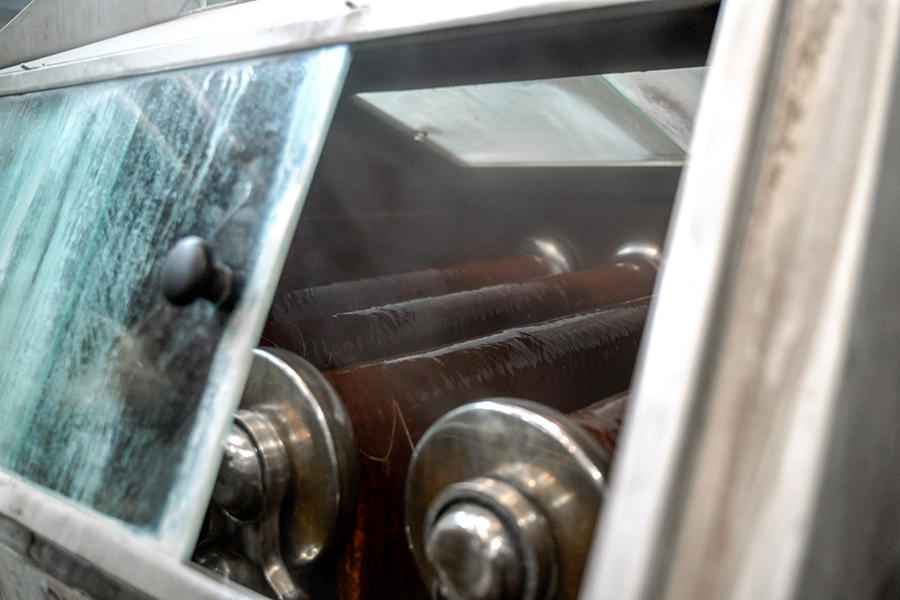 Hanks in the industrial painting bathrooms
Hanks in the industrial painting bathrooms Hanks dry in the sun after manual dyeing
Hanks dry in the sun after manual dyeingThe transformation processes
For washing, de-stripping, carding and spinning we are following two distinct paths.
A first path is that of protecting and enhancing the artisanal supply chain and plans to make use of very small artisan textile companies that operate in our territory. This choice obviously involves timing and costs which often lead us to have products that are off the market, but we are trying to find the right balance that makes this path economically sustainable also from our point of view.
The second way is the most traditional way of sending the fleeces directly to the Italian processing center in Biella and entrusting ourselves to smaller companies. structures that wash, spin and dye wool in compliance with Italian environmental regulations regarding emissions.
The wool bales then leave from central Italy to these destinations in northern Italy where they are washed only with water and soda. No finishing treatment is done to make it machine washable
ATTENTION hold on tight, no synthetic yarn is added to our yarns!. We are talking about real 100% virgin wool.
Perhaps not everyone knows that by law the definition of 100% Virgin Wool can be be applied to all those yarns made with virgin wool with the addition of polyamide or polyester as long as it is less than 7% of the total weight!
Let's say that 100% virgin wool in Italy could even be 93% but the consumer won't know what it is. never the actual composition! We invite you to take a microscope and look at our beanies made with Italian merinized wool and verify the accuracy of our 100% wool that we are extremely proud of!
"Part of the skeins produced will be hand-dyed in an artisanal way directly by us with natural products collected directly here in the Dolomites, others with standard OEKO industrial methods complying with Italian regulations which we must recognize as among the most strict in terms of environmental protection."
Diffuse Manufacturing
As we mentioned at the beginning of this article, merinized Italian wool yarns are currently used only within the Manifattura Diffusa di Elbec project for the production of wool headbands and caps.
The widespread manufacturing project involves the creation of handmade products by the inhabitants of our valley in the heart of the Dolomites in Veneto. The objective of the project is the creation of local artisan production, the revival of mountain traditions and the redistribution of small resources supplementing income.
If you want more info on the Manifattura Diffusa di Ebec project you can follow the link.
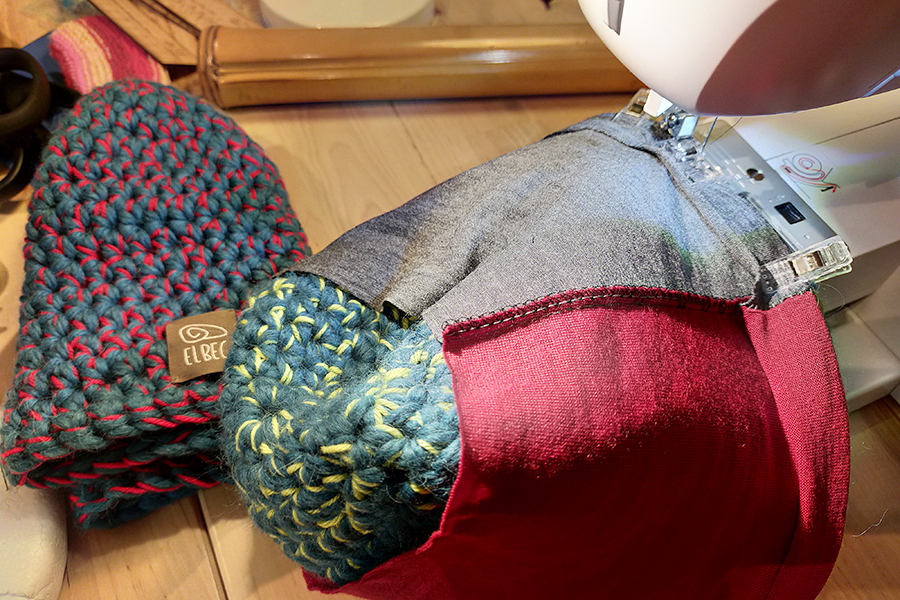 Handmade merino wool caps in progress
Handmade merino wool caps in progress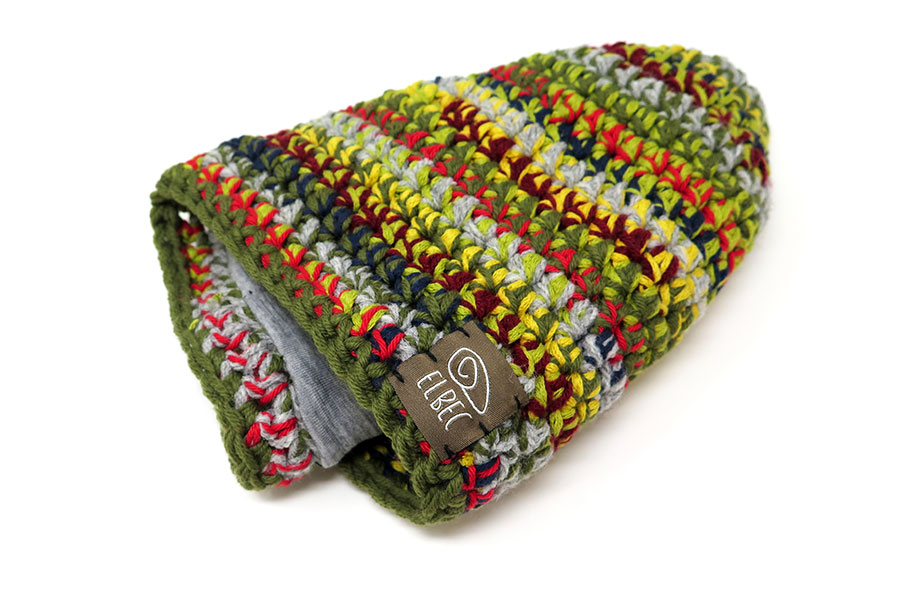 VANZAROT Caps made as part of the Manifattura Diffusa project
VANZAROT Caps made as part of the Manifattura Diffusa projectConclusion
Although with considerable difficulty we are carrying out the Traceable Short Supply Chain project and this project is giving us great satisfaction by offering us the possibility of to come into contact with different realities, environments and cultures even if they are all united by a common thread!
We believe that it is really possible to produce sustainably even if the global market strongly opposes it. The market opposes it because long supply chains and the current development model are not sustainable and arguing the opposite is possible only through the propaganda of "green washing".
The greater complexity that is encountered by operating locally and in a more traditional have the effect of raising production costs with the risk of having products that are not economically competitive compared to those produced by those who have chosen to relocate and produce elsewhere.
We don't know how it will go. to finish but we like to believe that a world that produces sustainably is really possible. The formula is probably always the same:









